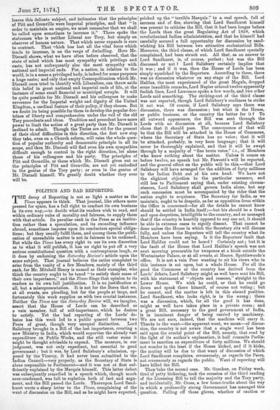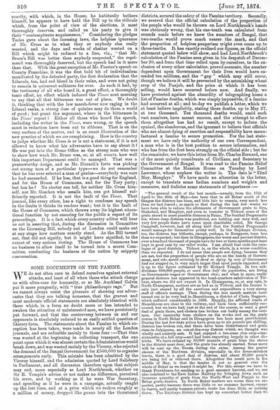POLITICS AND BAD REPORTING.
THE decay of Reporting is not so light a matter as the Times appears to think. That journal, like others more pressed for space, has a full right to conduct its own business in its own way,—to decide what its readers wish to read, and within ordinary rules of morality and fairness, to supply them with that article. Its peculiar rank in the Press as an institu- tion rather than a speculation, and its exceeding influence abroad, sometimes imposes upon its conductors special obliga- tions; but they usually fulfil them, and among them the publi- cation of unreadable matter is not in fairness to be reckoned. But while the Times has every right to use its own discretion as to what it will publish, it has no right to put off a very serious constitutional question with a contemptuous laugh, as it does by endorsing the Saturday Review's article upon the same subject. That journal believes the entire complaint to arise from the vanity of a few Members, mainly of the third rank, for Mr. Mitchell Henry is named as their exemplar, who think the country ought to be taxed "to satisfy their sense of their own importance," and the Times flings that opinion to its readers as its own full justification. It is no justification at all, but a misrepresentation. It is not for the Bores that we, at all events, are pleading, but for the people at large, and fortunately this week supplies us with two crucial instances. Neither the Times nor the Saturday Review will, we imagine, assert that the House of Lords can be described as a vain member, full of self-importance, which he desires to satisfy. Yet the bad reporting of the Lords' de- bates has this week led to a public quarrel between two Peers of great, though very unequal distinction. Lord Salisbury brought in a Bill of the last importance, creating a new Ministry in India, which would supervise the already vast expenditure on Public Works, and the still vaster sums it might be thought advisable to expend. The measure, in our judgment, was not only expedient, but essential to good government ; but it was, by Lord Salisbury's admission, op- posed by the Viceroy, it had never been submitted to the Indian Council—very properly, as the Secretary of State is alone responsible to Parliament—and it was not at first suf- ficiently explained by the Marquis himself. This latter defect was subsequently remedied in a speech which, though much over-condensed, was full to repletion both of fact and argu- ment, and the Bill passed the Lords. Thereupon Lord Sand- hurst wrote a sharp letter to the Times, complaining of the want of discussion on the Bill, and as he might have expected, pricked up the " terrible Marquis!' to a real speech, full of sarcasm and of fire, showing that Lord Sandhurst himself was present to criticise the Bill, that it had been longer before the Lords than the great Regulating Act of 1858, which revolutionised Indian administration, and that he himself had carefully secured a full opportunity for discussion by sand- wiching his Bill between two attractive ecclesiastical Bills. Moreover, the third clause, of which Lord Sandhurst specially complained, had been struck out. All that, as an answer to Lord Sandhurst, is, of course, perfect ; but was the Bill discussed or not ? Lord Salisbury certainly implies that it was ; and if it was, then the House of Lords has been simply squelched by the Reporters. According to them, there was no discussion whatever on any stage of the Bill. Lord Halifax, the most experienced of the great Moguls, dropped some inaudible remarks, Lord Napier uttered twelve apparently foolish lines, Lord Lawrence spoke a few words, and two other Lords said something. The striking-out of the third clause was not reported, though Lord Salisbury's readiness to strike it out was. Of course, if Lord Salisbury says there was discussion, there was discussion ; but what is the House, or public business, or the country the better for it ? To all outward appearance, the Bill was sent through the Lords with no discussion at all, because Lord Salisbury chose that it should pass. The consequence of that will be that the Bill will be attacked in the House of Commons, where the Secretary of State has no voice ; that it will be attacked, probably, in very keen language ; that it will never be thoroughly explained, and that it will be swept through by a majority of "fine brute votes," i.e., of Members who know nothing about the matter. Unless it comes on before twelve, no speech but Mr. Fawcett's will be reported, and the general effect on the public will be this,—that Lord Salisbury will have arranged for the addition of forty millions to the Indian Debt out of his own head. We have not the slightest objection to the particular measure, and still less to Parliament saying that, under existing circum- stances, Lord Salisbury shall govern India alone, but any such concession must be accompanied by the rider that the nation ought to acquiesce. The Secretary for India, as we maintain, ought to be despotic, as far as opposition from within the Office is concerned—for all the details he cannot know should be settled in India itself ;—but his should be a frank and open despotism, intelligible to the country, and so managed that if the country is heartily opposed to any one act, it should be able in extreme cases to signify dissent. That cannot be done unless the House in which the Secretary sits will discuss fully, and unless the Reporters will tell the country what its Members have been saying. Is it the Reporters' fault that Lord Halifax could not be heard ? Certainly not ; but it is the fault of the House that Lord Halifax's speech was not next morning procurable for twopence at a kiosk outside the Westminster Palace, or at all events, at Messrs. Spottiswoode's office. It is not a vain Peer wanting to air his views who in this instance is sat upon, but a whole House. For all the good the Commons or the country has derived from the Lords' debate, Lord Salisbury might as well have sent his Bill, with his statement of " objects and reasons," straight to the Lower House. We wish he could, or that he could go down and speak there himself, of course not voting ; but he cannot, and the matter is left in this absurd position. Lord Sandhurst, who looks right, is in the wrong ; there was a discussion, which, for all the good it has done, might as well have taken place in a private room; and a great Bill, necessary to the good government of India, is in imminent danger of being carried by machinery. We are not sure, indeed, that the machine will carry it. Thanks to the want—the apparent want, we mean—of discus- sion, the country is not aware that a single word has been said upon the crucial point of the Bill, namely, that read by the light of its author's explanation, it half commits Parlia- ment to sanction an expenditure of forty millions. We should not wonder in the least if the House kicked, and if it kicks, the mutiny will be due to that want of discussion of which Lord Sandhurst complains, erroneously, as regards the Peers, not erroneously as regards the public. Want of reporting will have killed the Bill.
Then'take the second case. Mr. Goschen, on Friday week, tired of petty bickering, took the occasion of the third reading of the Licensing Bill to tell the majority and the Tory party, and incidentally, Mr. Cross, a few home-truths about the way in which a professedly strong Government has managed this question. Pulling off those gloves, whether of caution or
suavity, with which, in the House, he habitually bothers himself, he appears to have held the Bill up to the ridicule which, from the point of view of the elections, it most thoroughly deserves, and called on his party to give it their "contemptuous acquiescence." Considering the pledges Tories gave about the licensing laws, the helpless ignorance of Mr. Cross as to what they or anybody else really wanted, and the days and weeks of chatter wasted on a Bill which might be reduced to a line, viz., " that Mr. Bruce's Bill was better than anybody suspected," the repri- mand was thoroughly deserved, but the speech had in it more than that. With the great exception of Mr. Forster's speech on County Franchise, it was the first bold bit of individualism manifested by the defeated party, the first declaration that the Liberals, too, had red blood in their veins, and were not going to remain in quiescent sulkiness for ever. As such it had, by the testimony of all who heard it, a great effect, a thoroughly tonic effect, an effect which induced the Times next morning to say that all that bitterness was out of place. We doubt it, thinking that with the low marsh-fever now raging in the Liberal ranks, a strong dose of quinine may do them a world of good ; but grant the argument, where is the bitterness in the Times' report ? Either all those who heard the speech, including the writer in the Times, were wrong, or the speech must in redaction have been cut to ribbons. That is on the very surface of the matter, and is an exact illustration of the new practice of which we are complaining. How is the country to judge whether Mr. Cross is or is not a statesman, if it is not allowed to know what his adversaries have to say about it ? He was put into the Home Office as the strong man who was to show how weak Mr. Bruce was, or, at all events, how well this important Department could be managed. That was a praiseworthy design, and as Mr. Disraeli's forte was picking out strong men of a particular type—we do not remember that he has ever selected a man of genius—everybody was sure ho had succeeded. If he has, that is a good thing for England, and for the House of Commons, and for the Tory party; but has he 9 No elector can tell, for neither Mr. Cross him- self, nor Mr. Goschen who assails him, can get himself suf- ficiently reported. It is not the fault of the Times. That journal, like every other, has a right to condense any speech to the limits it thinks its readers want ; but it is the fault of the House of Commons, which throws away its highest educa- tional function by not ensuring for the public a report of its proceedings. It is a fact which every country editor will bear us out in asserting that, during the discussion in Committee on the Licensing Bill, nobody out of London could make out at any stage how matters exactly stood. As the Bill turned out, that did not signify, but it might have signified, to the extent of very serious rioting. The House of Commons has no business to allow itself to be turned into a secret Com- mittee, conducting the business of the nation by snippety conversation.



































 Previous page
Previous page